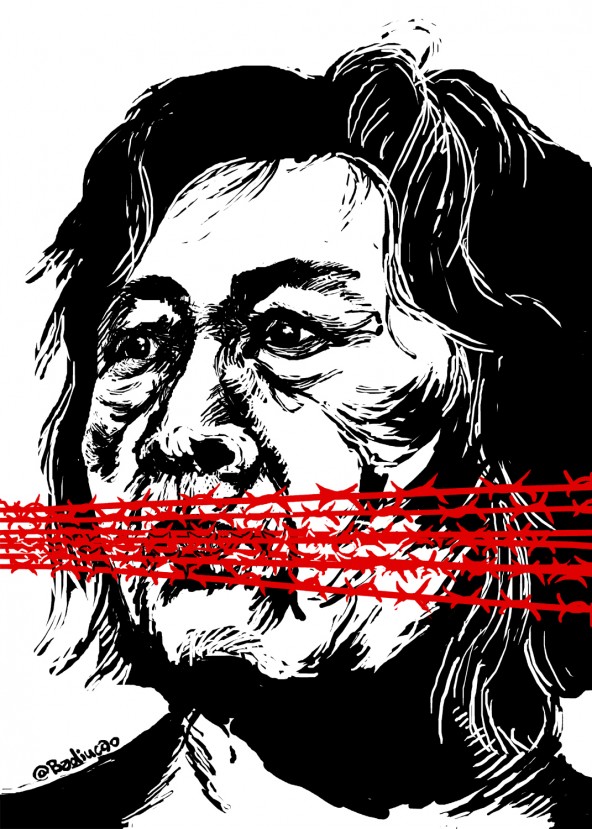To mark World Press Freedom Day, human rights groups drew attention to the Chinese government’s ongoing crackdown on speech online and in the media. In its annual index measuring press freedom around the world, Freedom House noted that China’s score “was its worst since the 1990s”:
CCP leaders use control of the media to propagate positive views of the party and government, while vilifying those deemed to be their enemies. In 2014, the authorities also continued to employ more subtle means to influence news coverage. In many cases they proactively set the agenda by allowing key state-run outlets to cover potentially damaging news in a timely but selective manner, then required other media to restrict their reporting to the established narrative. The aim is to preempt less favorable coverage by bloggers, foreign journalists, and the more aggressive commercial news outlets.
Restrictions on print media tightened during the year, as did pressure on investigative journalism and liberal media outlets. Journalists who attempted to investigate or report on controversial issues, question CCP rule, or present a perspective that conflicted with state propaganda directives faced harassment, dismissal, and abuse. In May, online journalist Zhang Jialong was dismissed from his position at the internet giant Tencent as apparent punishment for his comments about censorship during and after a February meeting with U.S. Secretary of State John Kerry and his publication of propaganda directives online. In July, journalist Song Zhibiao was dismissed from China Fortune magazine—reportedly on orders from propaganda officials—for contributing an article to a Hong Kong news website. This was the first known case of the authorities enforcing the new ban, issued earlier the same month, on mainland journalists collaborating with outside media organizations.
The government has developed the world’s most sophisticated and multilayered apparatus for censoring, monitoring, and manipulating online content. It is capable of a range of interventions, including localized internet blackouts during periods of unrest. On at least one occasion in 2014, local authorities completely shut down telecommunications in the Xinjiang city of Kashgar amid reported clashes between Uighur protesters and security forces. [Source]
China Human Rights Defenders called on the government to release a number of imprisoned journalists, notably Gao Yu, who was sentenced to seven years in prison for allegedly leaking a government document to an overseas website:
In a career spanning four decades, Gao has faced the government’s wrath for exposing corruption and misconduct in the top ranks of the CCP. She spent 15 months in detention for vocally supporting the pro-democracy movement in 1989, and in 1993 she was sent to prison for six years, also based on a “state secrets” charge, for her reporting that appeared in Hong Kong-based publications. Ever since, the government has barred her from publishing inside the country. In 1997, she was the first recipient of the UNESCO/Guillermo Cano World Press Freedom Prize, honored for her unwavering fight for press independence despite constant danger. Eighteen years later and in poor health, she is serving another prison term for championing press freedom in China.
“President Xi Jinping has drastically tightened the government’s grip on media,” said Renee Xia, CHRD’s international director. “But Xi’s anti-graft campaign is bound to fail if journalists who dare to report on the inner workings of the government are put in prison and online commentators are criminalized.” [Source]
Chinese journalist and commentator Chang Ping, who is now living in exile in Germany, writes for Deutsche Welle about the “China Cage,” an amorphous construct which limits the actions and speech of people in China:
Ten years ago, I had been fired once for critical reporting, but a short while thereafter I had the chance to publish two political weekly magazines and to write many commentaries as a result. Since then, I have been stripped of the opportunity to work as a journalist and write articles on mainland China, and even the government of Hong Kong denies me permission to work there. Against that backdrop, my family and I now live in exile.
Meanwhile the cage continues to contract, fooling many who live within its confines. Some see it as big enough to allow them and their friends to live and work in peace as long as they do not come up against its edges. Others believe the cage is getting bigger by the day, and their freedom with it. Then there are those who have recognized the truth, but who fool themselves and others, or people who blame the conditions of the cage on those locked inside, saying it is becoming more restrictive as a result of their own disobedience.
This thinking results in the cage becoming ever smaller. But the most monstrous thing is that such thoughts were spawned from within its bounds. The cage doesn’t only restrict freedom through imprisonment, but by changing thinking. It leads people to believe that life inside it is full of freedom, prosperity and happiness. [Source]
Read more about press freedom in China, via CDT.








